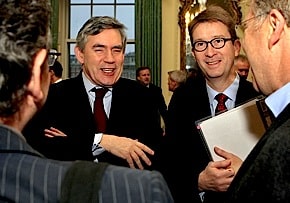
Communication minister Lord Carter’s final Digital Britain report wants to fund nationwide low-speed broadband and new multimedia news consortia from the BBC’s digital switchover funds, and truly high-speed networks from a levy on old phone lines. But anti-piracy action stops at mere bandwidth throttling and newspaper publishers have failed to win a relaxation in cross-media ownership laws. We have digested the key points from the 245-page report…
Broadband
— 2Mbps universal service obligation on telcos: ie. giving this minimum speed to the 10 percent of homes that can’t get it. As per January’s draft.
— Funding for the upgrade: from estimated £200 million from an underspend in the BBC’s Digital Switchover Help Scheme after 2012, plus commercial contracts, private-partner contributions, regional public sector beneficiaries, upgrade consumers themselves and from mobile spectrum roll-out.
— New CEO for Network Design and Procurement Group: Carter calls the BBC cash “direct public funding”
— Next-gen commitment: Beyond 2Mbps, telcos will be charged a levy of £0.50 per month on their copper wires, creating the Independent Next Generation Fund, a stash any telco can bid for to part-subsidise the roll-out of truly high-speed broadband to the final third of the market.
— Mobile upgrade: Operators will be allowed to keep 3G spectrum indefinitely if they begin building networks capable of up to 50Mbps.
— Analogue switch-off for govt services: “Online will become the primary means of access” to govt services after the 2Mbps guarantee, “though with a
safety net for those unable to access the service online”.
Intellectual property
— “Framework to encourage legal downloads“: “Most people, given a reasonable choice would much prefer not to do wrong.” So top priority to drive up legal use, eg. Technology Strategy Board will test “micropayments and other methods of monetisation of digital content” together with industry on next-gen networks.
— Ofcom charged with reducing piracy: Ofcom will introduce “notification of unlawful activity and, for repeat-infringers, a court-based process of identity release and civil action”.
— No three strikes, no disconnections: “Also providing for intermediate technical measures by ISPs, such as bandwidth reduction or protocol blocking if the two main obligations have been reasonably tried but, against expectations, shown not to have worked within a reasonable but also reasonably brisk period.”
— But morally tough, at least: “Piracy of intellectual property for profit is theft and will be pursued as such through the criminal law.
Broadcasting
— DAB switch-over: Digital-only national radio stations starting 2015, BBC asked to extend national DAB coverage, manufacturers asked to make DAB sets cheaper than £20.
— BBC/C4 must change: “The BBC